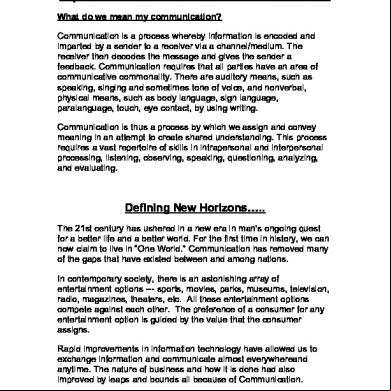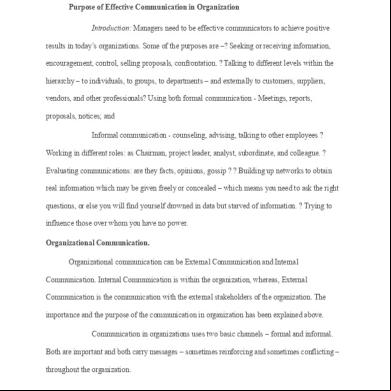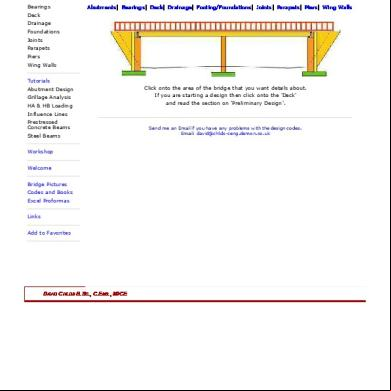1) Importance And Purpose Of Communication 2s213
This document was ed by and they confirmed that they have the permission to share it. If you are author or own the copyright of this book, please report to us by using this report form. Report 2z6p3t
Overview 5o1f4z
& View 1) Importance And Purpose Of Communication as PDF for free.
More details 6z3438
- Words: 1,949
- Pages: 10
SUBJECT : BUSINESS COMMUNICATION
CONTENTS S.NO 1. 2.
TITLE
3. 4.
COMMUNICATION IN ORGANISATION MANAGEMENT OF WRITTEN AND ORAL COMMUNICATION BARRIERS TO EFFECTIVE COMMUNICATION REPORT WRITING COMMUNICATION TECHNOLOGY-OFFICE PROCEDURES AND AUTOMATION HUMAN RESOURCES AND COMMUNICATION MULTINATIONAL COMMUNICATION TRAINING IN COMMUNICATION
5. 6. 7. 8. 9. 10.
IMPORTANCE AND PURPOSE OF COMMUNICAITON
PROCESS OF COMMUNICATION
COMMUNICATION Nearly 80% of our work time goes in communicating. The entire world is moving on communication. Our day starts with ‘communication’. What is ‘communication’, sharing, exchanging ones feeling with others is called communication. We have many acts like; 1. listening, 2. reading, 3. writing, 4. speaking, 5. Facial expressions. 6. movements, 7. colors, 8. gestures, 9. arts, 10.Ideas, facts, information, opinions etc. We express ourselves in many ways. Mainly in group of human beings communication is essential, infact it is a ’must’ factor. Let’s think what will happen to a family, a classroom, an office or a church without ‘communication’. The main purpose of the situation is depending upon the communication. Communication creates and executes the situation under all the circumstances. Hence the communication is an ‘in thing’ in our day to day life. It is an important aspect of behavior; human communication is affected by all factors that influence human behavior. Business Communication Communication is the main integrated ingredient of the business. No business can grow without proper communication channels. The word ‘communication’ is originated from the Latin word called ‘communis / communicare’ which means make common, that means sharing of information, or intelligence. Communication helps the business to flourish. Communication in any business should be very simple. Simplicity in communication channels would lead the company to the success.
Business Communications is defined as the “process of transmission of information within the business environment”. In earlier times it was thought communication finesse is required only for marketing and sales personal. But today, we know all the people irrespective of their occupation needed good communication skills at all the levels and in all the time. If it comes to an organizational level, we could make out or well imagine how their communicating power should be in dealing with their entire public, those includes workers, managements, customers, bankers, suppliers etc.
7Cs of Effective Communication Business Communication, both oral and written, demands more competency in language. In any business environment, adherence to the 7Cs helps the sender in transmitting the messages with ease and accuracy. Credibility: This implies that the sender of the message gives due importance to the receiver and composes the message. This kind of thoughtful approach to communication is also termed as you attitude. Courtesy: Once the credibility of the sender is established, attempts should be made at being courteous in expression. It expects the speaker/writer to be aware of the listener’s/reader’s feeling. In business communication, we not only on information but we also share and try to create a harmonious understanding for business to grow and develop and retain goodwill. Courtesy is not merely thank you and please, but it is a sincere and genuine expression that stems out of respect and care for others. In business world everything starts with and ends in courtesy. ‘Why you ask me to ring you up when you are not free to receive my calls’ (anger/rudeness) ‘I don’t mind ringing you up if you tell me when I can do so?’(being courteous) Clarity: Absolute clarity of the idea adds to the meaning of the message. The first stage is clarity in the mind of the sender. The next stage is the easier transmission of the message in a manner which makes it simple for the receiver to comprehend. The me4ssage of the4 letter should be clear in the first reading. Clear message avoid misunderstanding and saves time. Clarity depends on four factors: (i) Short and simple sentences. (ii) Proper punctuations (iii) Giving definite and concrete details.
(iv)
Logical sequence of ideas.
Correctness: Correct use of grammar, message and appropriate words adapting the right level of communication and the right tone for conveying the message to suit the receiver’s level determines the success of communication. If the sender decides to backup his communication with facts and figures, there should be accuracy in stating the same. Consistency: The approach to communication should, as far as possible be consistent / constant. There should not be too many ups and down that might lead to confusion in the mind of the receiver. Concreteness: Concrete and specific expressions are to be preferred in favour of vague and abstract expressions. ‘There has been a tremendous escalation in the sales figure.’ The listener is more apt to listen and comprehend factual details like ‘There has been an escalation in the sales figures by almost 50%as compared to last year.’ Conciseness: Conciseness means expressing much in few words. In business writing means keeping to the point, using few words as possible without sacrificing clarity and courtesy. Time is money. Credibility
-
Builds Trust
Courtesy
-
Improves Relationships
Clarity
-
Makes Comprehension easier
Correctness
-
Builds Confidence
Consistency
-
Introduces Stability
Concreteness -
Reinforces confidence
Conciseness
Saves time
-
4Ss of Effective Communication Shortness: “Brevity is the soul of wit”. If the message can be made brief, then transmission and comprehension of messages will be faster and more effective.
Simplicity: Simplicity, both in usage of words and ideas, reveals clarity in the thinking process. Strength: The strength of the message emanates from the credibility of the sender. If the sender believes in the message he is about to transmit, there is bound to be strength and conviction in whatever he tries to state. Half-hearted statements or an utterance that the sender himself does not believe adds a touch of falsehood to the entire communication flow. Sincerity: A Sincere approach to an issue is clearly evident to the receiver. If the sender is genuine, it will be reflected in the manner in which he communicates.
Shortness
-
Economizes
Simplicity
-
Impresses
Strength
-
Convinces
Sincerity
-
Appeals
1. IMPORTANCE AND PURPOSE OF COMMUNICATION Effective communication is useful for both organizations as well as for an individual. • For an individual: A well written resume, cover letter, convincing interview can get you the job you want even though more qualified people have applied for it. While working good verbal and non verbal communication helps to interact effectively with others and get work done efficiently. Unless you express effectively the purpose of your ideas, acts cannot be fulfilled and go unnoticed. Good writing skill will also increase the chances of getting promotion. Improving ones communication skills will benefit to the employee himself. Over a period of time they can become the assets of the organization they are working with. • For an organization: Improving communication skills helps not only you but also the organization. Communication helps in boosting employee morale, by keeping them informed about what is going on, involving them in decision making and getting from them regarding their opinions, attitudes and suggestions. Hence in an organization individual communication sills are as important as group or business communication. Importance in Business Communication Communication is the life blood of the organization. No business can perform without effective communication. There are number of important advantages of business communication: • Important qualification at the time of appointment and promotion. • Managing Complexity all around. • The big organization management – understanding and co-operation. • Up to date efficient and effective network • The image of the company increases • Profitability increases
• • • •
Opportunities available in the market can be known easily Effective tool of supervision. The employee turn over will be less – motivating and morale boosting. Customer interaction is better - negotiations and keeping s with distributors, retailers and individual customers. • Collection of information is easier. Objectives / Purpose of communication: In business, we have many reasons or purposes for communicating. Communication is an important tool or instrument to achieve the purpose and goals of an institution. Objectives of downward communication: Messages moving from seniors to subordinates in an organization or from persons with expert knowledge to lay persons. 1. Instructions: Instruction is information about how to carry out a process or procedure. Thought should be communicated clearly for running any organization. Every piece of work requires an instruction (communication). 2. Education & Training: Education is the development of the abilities of the mind. Training is practical education or practice in some skill, under the guidance and supervision of an expert. Education and training are both informative as well as persuasive. Both lead to discipline and development through learning, and practice. Special communication skills are required to accomplish these objectives. 3. Motivation: Motivation means providing a person with a motive, an incentive, an inner urge to make effort to do his best. Managers constantly try to improve performance in the workplace by motivating the staff. 4. Raising Morale: Morale is the state of mind and of discipline and spirit of a person or a group. In a work place, it is reflected in the individual and collective actions of the employees; it reflects their level of discipline and confidence. People with high morale feel good about themselves and are highly motivated and have the courage to face problems and meet challenges.
5. Counseling: Counseling is specialized form of advice. Stress, tension and some emotional problems can b e sorted out, treated and corrected at the health counseling centre of the company. 6. Persuasion: Means making efforts to change or influence the attitudes and behavior of others. Persuasion is achieved by skilful appeal to emotions. A great deal of communication in an organization is persuasive. 7. Appreciation: Showing and expressing praise for the work of others. Appreciation by managers and supervisors when employees do good work and make achievements creates a good attitude among the staff. Objectives of communication to authority: Communication moving from subordinates to superiors and from buyers to sellers. 1. Request: It is made by staff for various kinds of permission or favors. 2. Representation: Representation is always in writing. An employee, who feels that he has not been given what he deserves, for ex: a promotion makes a representation. A representation may be made by a group of persons too. 3. Complaints: Complaint is made when there are faults or defects in the system or in the goods supplied or services rendered, so that they may be corrected. A complaint may be oral or written. Within an organization, minor complaints may be adjusted by oral communication. In commercial transactions, it is necessary to make complaints in writing. 4. Discussion: Plans and projects require discussion and review, formal and informal meetings are held for this purpose. Daily routine matters may be settled by informal discussion. Discussions among persons of equal status have an educative value, and are used in training programs. 5. Suggestion: A new idea proposed for consideration. In an organization employees at all levels may suggest their supervisors or seniors, ideas on better procedures and methods.
The Benefits of Effective Communication:
Improved stakeholder response
Enhanced professional image
Clearer promotional materials
Quicker problem solving
Effective Communicat ion
Stronger decision making
Increased
productivity
Steadier work flow Stronger business
relationships
Reference Text: 1. Sen : Communication Skills (Prentice Hall India) 2. Cottrell .S – The study skills handbook 3. Turner .J – How to study : a short introduction 4. Theosarus – Merrilium-Oxford 5. Namita Gopal : Business Communication 6. Prof.B.V.Pathak – Communication Skills 7. Urmila Rai/S.M.Rai : Business Communication 8. Paul Turner : Organisational Communication 9. Gyani : Business Communications and Customer Relations 10.J.F.Purkis : Assignments in Communication 11.Asha Kaul : Effective Business Communications 12.Mohan : Developing Communication Skills
CONTENTS S.NO 1. 2.
TITLE
3. 4.
COMMUNICATION IN ORGANISATION MANAGEMENT OF WRITTEN AND ORAL COMMUNICATION BARRIERS TO EFFECTIVE COMMUNICATION REPORT WRITING COMMUNICATION TECHNOLOGY-OFFICE PROCEDURES AND AUTOMATION HUMAN RESOURCES AND COMMUNICATION MULTINATIONAL COMMUNICATION TRAINING IN COMMUNICATION
5. 6. 7. 8. 9. 10.
IMPORTANCE AND PURPOSE OF COMMUNICAITON
PROCESS OF COMMUNICATION
COMMUNICATION Nearly 80% of our work time goes in communicating. The entire world is moving on communication. Our day starts with ‘communication’. What is ‘communication’, sharing, exchanging ones feeling with others is called communication. We have many acts like; 1. listening, 2. reading, 3. writing, 4. speaking, 5. Facial expressions. 6. movements, 7. colors, 8. gestures, 9. arts, 10.Ideas, facts, information, opinions etc. We express ourselves in many ways. Mainly in group of human beings communication is essential, infact it is a ’must’ factor. Let’s think what will happen to a family, a classroom, an office or a church without ‘communication’. The main purpose of the situation is depending upon the communication. Communication creates and executes the situation under all the circumstances. Hence the communication is an ‘in thing’ in our day to day life. It is an important aspect of behavior; human communication is affected by all factors that influence human behavior. Business Communication Communication is the main integrated ingredient of the business. No business can grow without proper communication channels. The word ‘communication’ is originated from the Latin word called ‘communis / communicare’ which means make common, that means sharing of information, or intelligence. Communication helps the business to flourish. Communication in any business should be very simple. Simplicity in communication channels would lead the company to the success.
Business Communications is defined as the “process of transmission of information within the business environment”. In earlier times it was thought communication finesse is required only for marketing and sales personal. But today, we know all the people irrespective of their occupation needed good communication skills at all the levels and in all the time. If it comes to an organizational level, we could make out or well imagine how their communicating power should be in dealing with their entire public, those includes workers, managements, customers, bankers, suppliers etc.
7Cs of Effective Communication Business Communication, both oral and written, demands more competency in language. In any business environment, adherence to the 7Cs helps the sender in transmitting the messages with ease and accuracy. Credibility: This implies that the sender of the message gives due importance to the receiver and composes the message. This kind of thoughtful approach to communication is also termed as you attitude. Courtesy: Once the credibility of the sender is established, attempts should be made at being courteous in expression. It expects the speaker/writer to be aware of the listener’s/reader’s feeling. In business communication, we not only on information but we also share and try to create a harmonious understanding for business to grow and develop and retain goodwill. Courtesy is not merely thank you and please, but it is a sincere and genuine expression that stems out of respect and care for others. In business world everything starts with and ends in courtesy. ‘Why you ask me to ring you up when you are not free to receive my calls’ (anger/rudeness) ‘I don’t mind ringing you up if you tell me when I can do so?’(being courteous) Clarity: Absolute clarity of the idea adds to the meaning of the message. The first stage is clarity in the mind of the sender. The next stage is the easier transmission of the message in a manner which makes it simple for the receiver to comprehend. The me4ssage of the4 letter should be clear in the first reading. Clear message avoid misunderstanding and saves time. Clarity depends on four factors: (i) Short and simple sentences. (ii) Proper punctuations (iii) Giving definite and concrete details.
(iv)
Logical sequence of ideas.
Correctness: Correct use of grammar, message and appropriate words adapting the right level of communication and the right tone for conveying the message to suit the receiver’s level determines the success of communication. If the sender decides to backup his communication with facts and figures, there should be accuracy in stating the same. Consistency: The approach to communication should, as far as possible be consistent / constant. There should not be too many ups and down that might lead to confusion in the mind of the receiver. Concreteness: Concrete and specific expressions are to be preferred in favour of vague and abstract expressions. ‘There has been a tremendous escalation in the sales figure.’ The listener is more apt to listen and comprehend factual details like ‘There has been an escalation in the sales figures by almost 50%as compared to last year.’ Conciseness: Conciseness means expressing much in few words. In business writing means keeping to the point, using few words as possible without sacrificing clarity and courtesy. Time is money. Credibility
-
Builds Trust
Courtesy
-
Improves Relationships
Clarity
-
Makes Comprehension easier
Correctness
-
Builds Confidence
Consistency
-
Introduces Stability
Concreteness -
Reinforces confidence
Conciseness
Saves time
-
4Ss of Effective Communication Shortness: “Brevity is the soul of wit”. If the message can be made brief, then transmission and comprehension of messages will be faster and more effective.
Simplicity: Simplicity, both in usage of words and ideas, reveals clarity in the thinking process. Strength: The strength of the message emanates from the credibility of the sender. If the sender believes in the message he is about to transmit, there is bound to be strength and conviction in whatever he tries to state. Half-hearted statements or an utterance that the sender himself does not believe adds a touch of falsehood to the entire communication flow. Sincerity: A Sincere approach to an issue is clearly evident to the receiver. If the sender is genuine, it will be reflected in the manner in which he communicates.
Shortness
-
Economizes
Simplicity
-
Impresses
Strength
-
Convinces
Sincerity
-
Appeals
1. IMPORTANCE AND PURPOSE OF COMMUNICATION Effective communication is useful for both organizations as well as for an individual. • For an individual: A well written resume, cover letter, convincing interview can get you the job you want even though more qualified people have applied for it. While working good verbal and non verbal communication helps to interact effectively with others and get work done efficiently. Unless you express effectively the purpose of your ideas, acts cannot be fulfilled and go unnoticed. Good writing skill will also increase the chances of getting promotion. Improving ones communication skills will benefit to the employee himself. Over a period of time they can become the assets of the organization they are working with. • For an organization: Improving communication skills helps not only you but also the organization. Communication helps in boosting employee morale, by keeping them informed about what is going on, involving them in decision making and getting from them regarding their opinions, attitudes and suggestions. Hence in an organization individual communication sills are as important as group or business communication. Importance in Business Communication Communication is the life blood of the organization. No business can perform without effective communication. There are number of important advantages of business communication: • Important qualification at the time of appointment and promotion. • Managing Complexity all around. • The big organization management – understanding and co-operation. • Up to date efficient and effective network • The image of the company increases • Profitability increases
• • • •
Opportunities available in the market can be known easily Effective tool of supervision. The employee turn over will be less – motivating and morale boosting. Customer interaction is better - negotiations and keeping s with distributors, retailers and individual customers. • Collection of information is easier. Objectives / Purpose of communication: In business, we have many reasons or purposes for communicating. Communication is an important tool or instrument to achieve the purpose and goals of an institution. Objectives of downward communication: Messages moving from seniors to subordinates in an organization or from persons with expert knowledge to lay persons. 1. Instructions: Instruction is information about how to carry out a process or procedure. Thought should be communicated clearly for running any organization. Every piece of work requires an instruction (communication). 2. Education & Training: Education is the development of the abilities of the mind. Training is practical education or practice in some skill, under the guidance and supervision of an expert. Education and training are both informative as well as persuasive. Both lead to discipline and development through learning, and practice. Special communication skills are required to accomplish these objectives. 3. Motivation: Motivation means providing a person with a motive, an incentive, an inner urge to make effort to do his best. Managers constantly try to improve performance in the workplace by motivating the staff. 4. Raising Morale: Morale is the state of mind and of discipline and spirit of a person or a group. In a work place, it is reflected in the individual and collective actions of the employees; it reflects their level of discipline and confidence. People with high morale feel good about themselves and are highly motivated and have the courage to face problems and meet challenges.
5. Counseling: Counseling is specialized form of advice. Stress, tension and some emotional problems can b e sorted out, treated and corrected at the health counseling centre of the company. 6. Persuasion: Means making efforts to change or influence the attitudes and behavior of others. Persuasion is achieved by skilful appeal to emotions. A great deal of communication in an organization is persuasive. 7. Appreciation: Showing and expressing praise for the work of others. Appreciation by managers and supervisors when employees do good work and make achievements creates a good attitude among the staff. Objectives of communication to authority: Communication moving from subordinates to superiors and from buyers to sellers. 1. Request: It is made by staff for various kinds of permission or favors. 2. Representation: Representation is always in writing. An employee, who feels that he has not been given what he deserves, for ex: a promotion makes a representation. A representation may be made by a group of persons too. 3. Complaints: Complaint is made when there are faults or defects in the system or in the goods supplied or services rendered, so that they may be corrected. A complaint may be oral or written. Within an organization, minor complaints may be adjusted by oral communication. In commercial transactions, it is necessary to make complaints in writing. 4. Discussion: Plans and projects require discussion and review, formal and informal meetings are held for this purpose. Daily routine matters may be settled by informal discussion. Discussions among persons of equal status have an educative value, and are used in training programs. 5. Suggestion: A new idea proposed for consideration. In an organization employees at all levels may suggest their supervisors or seniors, ideas on better procedures and methods.
The Benefits of Effective Communication:
Improved stakeholder response
Enhanced professional image
Clearer promotional materials
Quicker problem solving
Effective Communicat ion
Stronger decision making
Increased
productivity
Steadier work flow Stronger business
relationships
Reference Text: 1. Sen : Communication Skills (Prentice Hall India) 2. Cottrell .S – The study skills handbook 3. Turner .J – How to study : a short introduction 4. Theosarus – Merrilium-Oxford 5. Namita Gopal : Business Communication 6. Prof.B.V.Pathak – Communication Skills 7. Urmila Rai/S.M.Rai : Business Communication 8. Paul Turner : Organisational Communication 9. Gyani : Business Communications and Customer Relations 10.J.F.Purkis : Assignments in Communication 11.Asha Kaul : Effective Business Communications 12.Mohan : Developing Communication Skills










